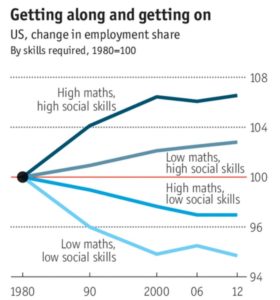
A recent Economist report on the importance of continuous learning revealed a number of interesting insights. It is fairly well known that jobs involving technical skills, for example Science, Technology, Engineering and Math (so called STEM skills) are the fastest part of the job market. However, the Economist pointed out that people who combine Social Skills with technical skills (i.e. Math skills) have significantly greater opportunities in the job market than those with high Math skills alone.
According to the Economist report: “Since 1980 growth in employment and pay has been fastest in professions across the income scale that put a high premium on social skills”. (see graph below).
Social Skills are not just about the ability to get along with others (although that is certainly an important skill). In our experience helping thousands of highly technically-skilled people to improve their relationships with customers and colleagues we have found that there are 3 skills that everyone needs to develop in order to be successful, not only in their professional life, but in their private life as well.
- The ability to create empathy with another person and to understand the emotional issues that are affecting their behavior.
- The ability to communicate openly with others through active listening.
- The ability to collaborate with other people and to find solutions to problems that balance the interests of everyone involved.
Why are Social Skills important for companies?
The benefits of having high levels of Social Skills are obvious for employees – the higher the social skills the greater the job opportunities. But for companies willing to invest in the development of their employees’ social skills, the returns are also impressive.
For example, another study by the Technology Service Industry Association revealed that by providing training in ‘soft skills’, another term for social skills, companies could significantly improve employee retention and motivation as well as customer satisfaction scores.
According to the TSIA data:
“Employee attrition has grown from 6% to 13.5%, CSAT has declined from 4.5 to 3.9, and employee satisfaction declined from 81% to 71%. So, what has changed? Back in 2014, an average of 4 days per support professional was allocated to soft skills (i.e. social skills) training, but according to our 2016 study, that number has declined to only 2 days.”
Enabling employees to develop these skills requires companies to understand and appreciate the value that comes from an investment in these areas. One of our clients, a global director for field service for a major technology company explained why they decided to make the investment in social skills – “Another challenge was just morale for our employees. It’s a tough environment and our people were having crucial conversations with some tough customers. And we wanted to give them skills which would help them get to a better result.”


